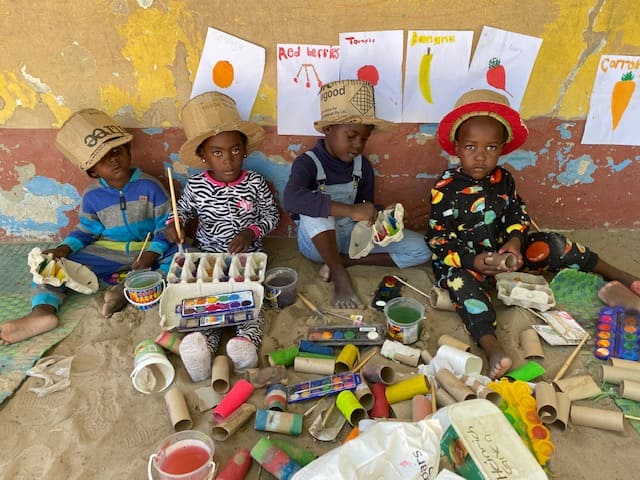Maria Ngonga chose to be a nursery school teacher because she has fond memories of her own preschool teachers and enjoys spending time with children.
She never imagined that she would one day train 123 other nursery school teachers with the help of the Perivoli Schools Trust.
The story of the trust starts in 2004, with the construction of the Perivoli Okonjima Country School.
The organisation had decided to support early childhood development in Namibia through the construction of nursery schools.
The trust’s founder, James Alexanderoff, quickly encountered two major obstacles though.
The first was the sustainability of widespread nursery school construction efforts and the second was the limited number of professionally trained nursery teachers in rural areas.
Alexandroff in 2012 decided to change his approach to transforming early childhood education in Namibia.
“Instead of laying bricks, we decided to focus on training people,” he says.
This decision resulted in the training of 5 500 nursery school teachers to date and the Perivoli Schools Trust expanding to all 14 Namibian regions.

PRIORITISING PLAY
Ngonga had been a nursery school teacher for three years when she became part of the Perivoli Schools Trust’s pilot project in the Kavango region.
She says the programme stood out because it required few inputs and yielded a multitude of outputs for children and their communities.
“The organisation brought a unique programme that just needs time, energy and love,” she says.
The training programme focuses on play.
“Play is not a well-understood concept. It is, however, the way that children learn. Playing is learning,” Alexanderoff says.
Classrooms in the Perivoli system integrate play through the creation of 12 corners, representing 12 progress indicators.
Among these corners is a reading, nature, fantasy, shop, music, arts and crafts and puzzles corner.
Theresia Muushandja, a lecturer at the Namibian University of Science and Technology, says early childhood education in Namibia is too formalised, disadvantaging children.
“They should be in environments where their talents are enhanced and where they are allowed to do things they enjoy,” she says. Mushaandja also says childhood education is critical to development.
“If we are not deliberate … we will have children getting through a system who won’t be able to do anything in the end,” she says.

Alexanderoff says all the learning materials found in the 12 corners can be created by teachers themselves.
“Our training model around the use of recyclable materials in classroom activities makes it highly scalable and affordable, as it’s free to the teachers,” he says.
Ngonga says teachers essentially transform their own classrooms from the moment they start training, as they learn how to create items to awaken the children’s imagination in areas like fantasy, nature and construction.
‘By training them, they started to go and collect used materials for us to use as teaching aids, like bottle tops, boxes, egg trays, containers and so on. The educators’ classes transformed from empty rooms to classes filled with learning materials,” she says.
Caroline Kahere, whose journey as a Perivoli-trained educator began in February 2016 at Okahandja, says the training material creation has become a community-wide effort.
“The community is seeing the importance of recycling, so they don’t throw away things any more. They send empty containers and boxes with their children to the schools,” she says.
Kahere says a highlight has been witnessing the capacitation of teachers through the building of classroom materials.
“Some classes started with no materials at all, but when you look at them now, the classes have been transformed,” she says.

TRAINING TRAINERS
Ngonga became a trainer in 2012 and has been facilitating the training of other preschool teachers across the country since then.
“In 2012, I became a trainer and I had two groups, with 65 educators in total. In May 2015, I became a regional coordinator and during this time I continued training other educators,” she says.
Kahere trained roughly 80 teachers across Namibia before she was promoted to supervising other trainers.
“By the end of 2017, I got promoted as the regional coordinator for the Khomas region. By 2021, I relocated to the north to be a regional coordinator for the Omusati, Oshana, Oshikoto and Kunene regions.”
The teachers are taught to develop children’s social skills, audio-visual perception and fine motor skills.
They are also trained on gender and inclusion issues, hygiene and environmental education.
Alexanderoff says technology is incorporated into every aspect of the programme to allow monitoring and evaluation, as well as innovation.
“Trainers are equipped with tablets to use for recording data on all interactions and progress of the teachers,” he says.
Ngonga says through the programme she learned how to use technological devices in her work.
“I encourage new trainers to embrace the use of technology in their classes,” she says.
To date, the trust has trained 25 000 nursery school teachers in five countries in sub-Saharan Africa, including Malawi, Zambia, Uganda and Botswana.
The programme is funded by the Perivoli Foundation, an Africa-focused charity in the United Kingdom.



Leave a Reply